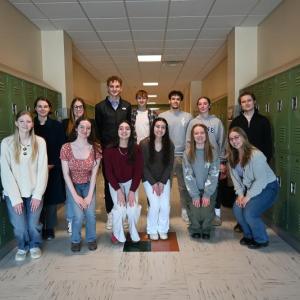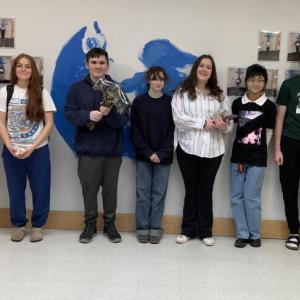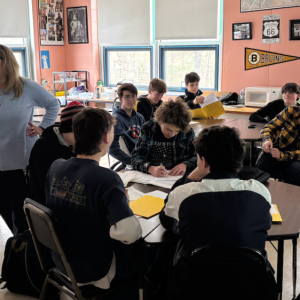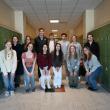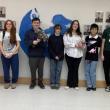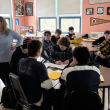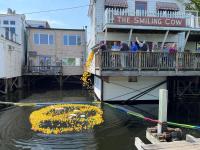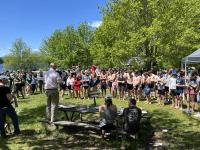Five Midcoast high schools prepare for Model U.N. Conference to be held in Belfast
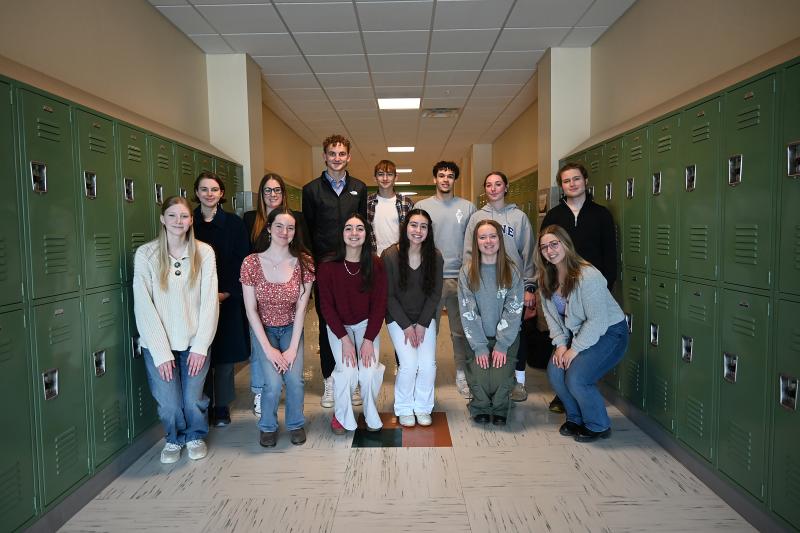 Mt. View Model U.N. Club includes, front row: Brooke Anderson, Lindsey Kenney, Julia Richards, Emily Richards, Sierra Caruso, Layla McCormick; back row: Lauren Hurst, Katelyn Condon (teacher), Ben Grassi, Abel Grassi, Miles Carter, Olivia Kirby and Ruben Widmer. (Photo courtesy Mt. View High School)
Mt. View Model U.N. Club includes, front row: Brooke Anderson, Lindsey Kenney, Julia Richards, Emily Richards, Sierra Caruso, Layla McCormick; back row: Lauren Hurst, Katelyn Condon (teacher), Ben Grassi, Abel Grassi, Miles Carter, Olivia Kirby and Ruben Widmer. (Photo courtesy Mt. View High School)
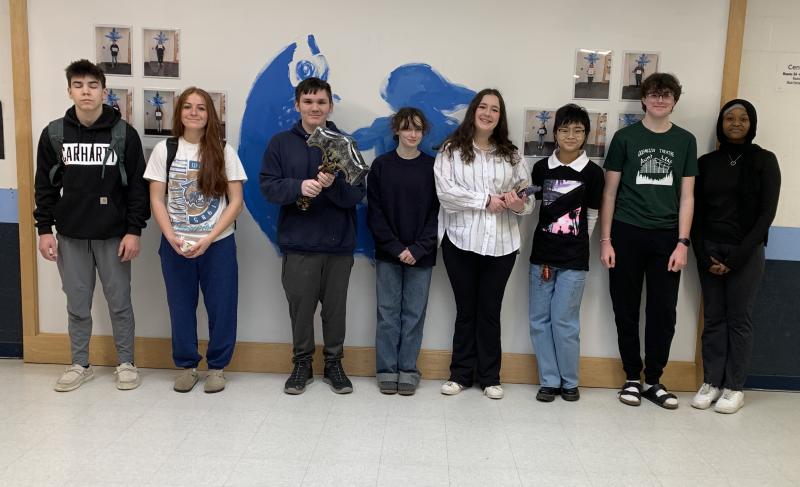 Rockland's Oceanside High School students get ready for the April 11 Model UN Conference in Belfast. From left to right: Josh Pratt, Aubri Hoose, Erik Milton, Autumn Hill, Scout Bookham, Sam Bernardo, Kaden Curtis and Naima Ousseyni Kalilou. Missing: Kayla Baines, Sienna Geretz, Renee Ripley, Ava Curtis, Joshua Placides.
Rockland's Oceanside High School students get ready for the April 11 Model UN Conference in Belfast. From left to right: Josh Pratt, Aubri Hoose, Erik Milton, Autumn Hill, Scout Bookham, Sam Bernardo, Kaden Curtis and Naima Ousseyni Kalilou. Missing: Kayla Baines, Sienna Geretz, Renee Ripley, Ava Curtis, Joshua Placides.
 The Belfast High School Model U.N. Club. (Photo courtesy Micaela Schweitzer-Bluhm)
The Belfast High School Model U.N. Club. (Photo courtesy Micaela Schweitzer-Bluhm)
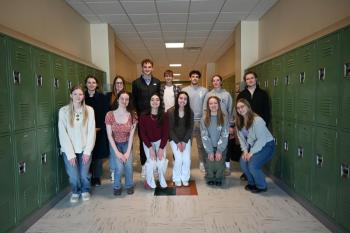 Mt. View Model U.N. Club includes, front row: Brooke Anderson, Lindsey Kenney, Julia Richards, Emily Richards, Sierra Caruso, Layla McCormick; back row: Lauren Hurst, Katelyn Condon (teacher), Ben Grassi, Abel Grassi, Miles Carter, Olivia Kirby and Ruben Widmer. (Photo courtesy Mt. View High School)
Mt. View Model U.N. Club includes, front row: Brooke Anderson, Lindsey Kenney, Julia Richards, Emily Richards, Sierra Caruso, Layla McCormick; back row: Lauren Hurst, Katelyn Condon (teacher), Ben Grassi, Abel Grassi, Miles Carter, Olivia Kirby and Ruben Widmer. (Photo courtesy Mt. View High School)
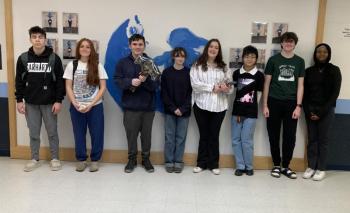 Rockland's Oceanside High School students get ready for the April 11 Model UN Conference in Belfast. From left to right: Josh Pratt, Aubri Hoose, Erik Milton, Autumn Hill, Scout Bookham, Sam Bernardo, Kaden Curtis and Naima Ousseyni Kalilou. Missing: Kayla Baines, Sienna Geretz, Renee Ripley, Ava Curtis, Joshua Placides.
Rockland's Oceanside High School students get ready for the April 11 Model UN Conference in Belfast. From left to right: Josh Pratt, Aubri Hoose, Erik Milton, Autumn Hill, Scout Bookham, Sam Bernardo, Kaden Curtis and Naima Ousseyni Kalilou. Missing: Kayla Baines, Sienna Geretz, Renee Ripley, Ava Curtis, Joshua Placides.
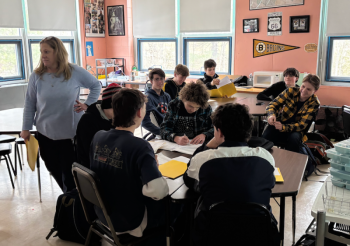 The Belfast High School Model U.N. Club. (Photo courtesy Micaela Schweitzer-Bluhm)
The Belfast High School Model U.N. Club. (Photo courtesy Micaela Schweitzer-Bluhm)
Approximately 55 students representing Belfast, Mt View, Oceanside and Searsport high schools, along with the Ecology Learning Center, a charter high school in Unity, are busy practicing their oratorical skills and drafting resolutions in advance of the third annual Model United Nations Conference taking place in Belfast, April 11.
The conference this year is particularly distinctive, given the U.S.A.’s own economic and political repositioning of its global relations. The students — in this case, acting as delegates from different countries — are almost ready to convene. They come from communities in Knox and Waldo counties, stretching along Penobscot Bay from Rockland to Searsport, and inland to Thorndike.
Likewise, 10 college students, all representing Bowdoin's Model U.N. Club, will drive to Belfast from Brunswick on Friday to chair the three model high school committees that will present at the conference.
The 2025 focus is on two topics: denuclearization and persistent organic pollutants. Last year, it was the Russia-Ukraine War, as well as climate change refugees.
While the topics are to be fleshed out in detail, there are other exercises underway at these model conferences, which take place across the U.S. at university campuses and local high schools.
The student delegates get immersed in parliamentary procedure and critical thinking. They refine academic inquiry and writing skills, careful to adhere to MLA or Chicago Manual of Style requirements. They learn how to be strict with their citations and bibliography, and they polish their debate skills.
Whether at the student Model U.N. Conferences (created in the 1950s) or at the 1943-established United Nations, it is a disciplined method to resolve the world's problems, or at least attempt to do so.
"Model UN is a simulation of the UN General Assembly and its other multilateral bodies where students perform an ambassador role while debating topics such as gender equality, climate action, global health, and more," the United Nations Association of the USA says.
Todd Bluhm, of Belfast, is the local organizer behind the Midcoast Model U.N. Conference, and with help of the Midcoast Forum on Foreign Relations, he got the ball rolling with the area high schools three years ago. It was a leap, but as a former U.S. diplomat, he is well accustomed to engaging communities.
He told himself, "let's just do this and the net will appear."
That net, "for us, ended up being Bowdoin College," said Bluhm.
"Universities often have Model U.N. clubs and they will host a conference," he said. "Some are very competitive and very well regarded. High school teams apply and go to the conferences. College kids play the role as chairs of a committee, sitting at the front of the dais with their gavel, entertaining motions or recognizing delegates who have a motion."
He and George Look, current president of the Midcoast Forum on Foreign Relations, had been searching for someone in higher learning to help with their effort. They were directed to a freshman at Bowdoin, who wanted to revive the Model U.N. Club there, which had, "gone quiet during Covid.”
The two collaborated, and several years later, the participating Midcoast high school clubs have grown in size. At first, they individually drew eight nine interested students; now, they are up to 15 or 16, said Bluhm.
As the annual process begins, the Bowdoin students pick the topic, and then write a 20- to 30-page background paper on it, researching what the U.N. has done to address the issue, as well as each participating U.N. country, ”to prime the pump, essentially," said Bluhm.
The high school students then receive a "Briefing Book," which includes the academic background paper. That not only provides information about the topic at hand, but it also lends a thorough window of what is required in writing higher education academic papers.
Then, the high school students write their position papers, which outline their assigned country's statement on the assigned topic. They then turn those papers back to the Bowdoin Club for review.
Resolutions are produced, and high school student delegates arrive at the conference, deliver opening statements, and negotiate with each other. It becomes an exercise of building alliances.
"So you have to know your country's values and interests on this issue, but also those of the other countries in the room," Bluhm said.
After serving as a diplomat in the Middle East and Balkans, Bluhm and his wife, Micaela Schweitzer-Bluhm, who is also a retired diplomat, retired to Belfast with their three teenagers. He was compelled him to start the Model U.N. Conference in the Midcoast when he recognized a gap in the study of international affairs.
"I knew that it was something that colleges value, and that it is good for the kids," he said. "It teaches so many things."
"You don't attend the conference as a team, say, from Belfast," Bluhm said. "When I give countries to a school, I do not pick them to be allies. At the conference, their potential allies are going to be from other schools and the kids from their own schools might have interests inimical to their own. It is also a cross-fertilization to their schools."
The conference is limited to one day, which means much negotiation and conversation takes place in a limited timespan.
And while there was some concern by the college students that the topics were too "heavy" for high school students, Bluhm considers the gravity of the research and resulting conversations apropos.
"I said, 'no, this is good,'" he told the Bowdoin Club. "'It shows the high school kids that people are doing something about it. That there is a U.N. that is talking about these issues. That other countries care and are trying to help. It shows you that there is a vehicle to help. That is the U.N. and diplomacy.'"
Reach Editorial Director Lynda Clancy at lyndaclancy@penbaypilot.com; 207-7076-6657

